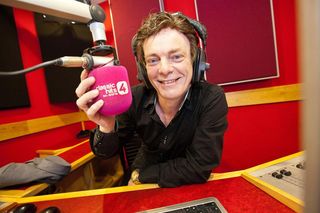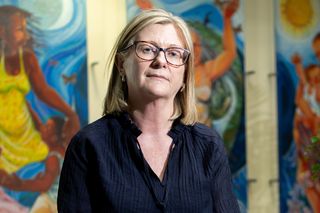Ireland's Buddhists: Why more of us are opting for a gentler brand of faith with a focus on contemplation
Buddhism is growing rapidly in Ireland, with interest fuelled by the popularity of mindfulness as a stress-reliever.
Daniel Canning at the Dublin Buddhist Centre. Photo: Damien Eagers
Over the last decade the practice of mindfulness has been thriving in Ireland as people seek inner respite from an increasingly hectic world.
It has now become a vital tool in the maintenance of mental health. Its recommended by the medical profession, seen as hugely important for young people and local mindfulness classes have cropped up nationwide.
But many attending the classes are unaware that mindfulness has its origins in Buddhism - unless, of course, they attend the classes run by the varied and plentiful Buddhist centres across Ireland today.
More of us than ever are turning to Buddhism. The latest census revealed that there are now 9,358 Buddhists in Ireland. That's an 11pc increase on the 2011 census findings. And a 43pc hike from a decade ago when the 2006 census recorded 6,516 Buddhists here.
And many believe the 2016 figure is, if anything, conservative.
Jnanadhara from New Zealand who runs the Dublin Buddhist Centre, and has lived in Ireland since 2004, says: "I think perhaps because of the way the census question was posed many who practise Buddhist teachings, but who were brought up as perhaps Catholic or Protestant, were confused. If the question was 'what religion do you practise?' then you'd find a far greater number of people who use some form of Buddhism in their lives."
MORE THAN MEDITATION
As with other faiths there are different branches of the religion operating in Ireland today.
The Dublin Buddhist Centre is part of the Triratna Buddhist Community, which has mainly Indian roots, and each week it caters for Dubliners who visit the centre on James Joyce Street to slow down, meditate and learn more about Buddhism.
"We have people coming to us from all walks of life," says Jnanadhara.
"Perhaps Buddhism was once seen as some kind of hippie fringe religion but that's completely changed.
"The growth of mindfulness has certainly brought more people to Buddhist teachings but I've noticed in recent years that people are coming to the centre wanting to find out more about Buddhism itself rather than just meditation."
Jnanadhara tells me that roughly half of those attending retreats and meditation courses through the Dublin Buddhist Centre are non-Irish by birth. Across the city in Kilmainham the Tibetan Buddhist Meditation Centre for World Peace and Health offers silent meditation, chanting practices, seminars, readings, talks and yoga in its impressive and calming shrine.
This year the centre celebrates its 40th anniversary.
AN ABSENCE OF JUDGMENT
In Munster too some new, and not so new, Buddhist retreat centres are seeing an increase in visitor numbers.
At the Palpung Ireland Buddhist Centre in the Cork town of Banteer, a Kerry woman is the resident teacher.
Anita Treacy found Buddhism while visiting India many years ago. She became a Buddhist nun and took on the name Ani Choedrun Lhamo. Now she teaches meditation and Buddhist philosophy to those looking for something different in their lives.
"We, as a country, became very rich, very quickly and then everything collapsed," she says. "People now are really starting to look more inwardly and Buddhism gives us that freedom. Nobody has to sign up, nobody has to actually become a Buddhist to avail of what we have to offer and I think that really appeals to people in Ireland today."
Indeed, the absence of 'judgment' is an aspect of Buddhism which is particularly appealing, according to Jnanadhara in the Dublin Buddhist Centre.
"In many ways traditional religions offer a 'take it or leave it' approach and people aren't always satisfied with that," he says. "Buddhists do not believe in a god that will punish those who commit sins and for many that's refreshing. It's not an authoritarian religion but rather one which encourages debate, conversation and contemplation."
IRELAND'S FIRST TIBETAN TEMPLE
The diggers at the Dzogchen Beara Retreat Centre in Allihies, West Cork signal a facility and religion in expansion mode.
Already three floors of Ireland's first Tibetan Buddhist Temple have been built overlooking Bantry Bay. East meets West by Atlantic waters.
It's an ambitious project with €1.2m already spent on the temple.
"We need to fund raise another half a million by July so we can stay on schedule," explains the centre's director Malcolm MacClancy.
"Our hope is that by St Patrick's Day 2018 we will have a fully functional building. We'll need another €200,000 for sacred decoration at the end and then at some stage in the summer of 2019 his Holiness Sakya Trizin will come to officially consecrate the temple which will be seen as something of a jewel in the crown of Tibetan Buddhism in the world," he adds.
I ask Malcolm, who became a Buddhist in 1995 at the age of 25, why he believes more Irish people are turning to the religion today.
"Buddhism encourages us to have confidence in our fundamental goodness and to nurture that; we're all 'Buddhas to be'. Buddha realised his full enlightened potential and we're on that path; to unveil the innate wisdom and compassion that all beings share. This focus on our positive attributes, personal responsibility and interdependence seems increasingly relevant to people in Ireland today."
Last year, 7,500 people engaged with meditation, either in daily sessions or on retreats at Dzogchen Beara and that figure is expected to rise this year.
MacClancy says it's the open-door policy of Buddhism which allows people to come and see if it works for them.
"People don't feel threatened by Buddhism; the teachings and practices are open to everybody. We're not about conversion but about communicating the teachings of Buddha to women and men so it is relevant in their modern lives."
I feel happier and more content with my life
Daniel Canning (20), law student and Buddhist from Dublin
By Graham Clifford
Daniel Canning will sit the first of his law exams at Maynooth university next Saturday but while his classmates may be fretting, the 20-year-old Dubliner will take to his chair feeling relaxed.
"I've always been fairly laid-back but since I started Buddhist meditation and implemented the practical Buddhist teachings in my everyday life I'm certainly even more chilled out," he tells me. Though Daniel, the eldest of three, was raised in a Catholic family in Clondalkin, he says his parents aren't overly religious.
And so in his mid-teens he started to explore the content of other religions.
"I never felt Catholicism was for me. The whole judgment and blind faith element just didn't tally. I went into the library in Maynooth and found a section on Buddhism and before long, with the help of videos on YouTube, I was meditating. Buddhist practices and teachings are quite logical and that really appealed to me."
Keen to learn more, he attended the Dublin Buddhist Centre on James Joyce Street a year ago and in February had his mitra ceremony where he confirmed his commitment to following the Triratna Buddhist teachings.
"I think a lot of my friends initially thought this was just a fad I was going through. But it's so much more than that and I feel happier and more content with my life. Even my parents can see the improvement in my personal relationships with them, I'm better at communicating and listening."
Daniel doesn't envisage a legal career for himself into the future per se but may consider something in international relations or the area of human rights.
And one unplanned benefit of his conversion is the discovery of vegan food.
"Obviously one pillar of the faith is the respect of all living things so we don't eat meat. I was brought up in a big meat-eating house so at first on our retreats, I wasn't sure about the vegan food. But I've developed a taste for it now and along with daily meditation, the healthy eating aspect really makes you feel so much better physically."
Join the Irish Independent WhatsApp channel
Stay up to date with all the latest news














